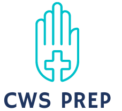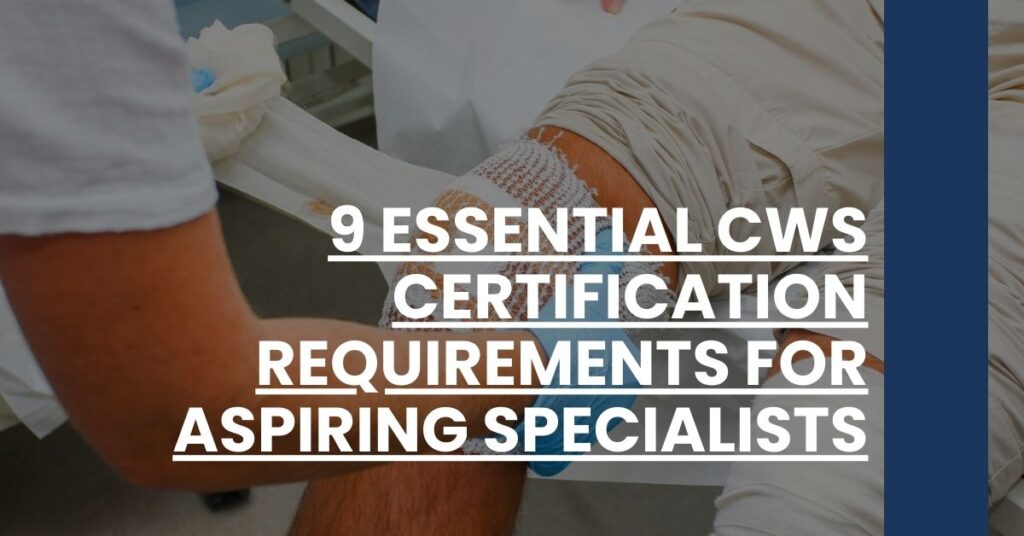Wondering if you’ve got what it takes to earn the coveted CWS certification? Achieving this milestone requires meeting specific CWS certification requirements and a commitment to excellence in wound care.
This post breaks down the essential prerequisites, from clinical experience to educational qualifications, ensuring you have a clear map of the journey to certification.
Ready to advance your career and hone your expertise? Let’s explore what lies ahead for aspiring Certified Wound Specialists.
- 1. Understanding the CWS Certification Purpose
- 2. Meeting the Eligibility Criteria
- 3. Required Wound Care Experience
- 4. Education and Degrees Necessary
- 5. Examination Preparation and Study Guidelines
- 6. CWS Certification Exam Information
- 7. Application Process and Fees
- 8. Renewal and Recertification Procedures
- 9. Maximizing Return on CWS Certification Investment
- Related Topics: Exploring the Benefits of CWS Certification
- Conclusion: Taking the Next Steps Toward Certification
1. Understanding the CWS Certification Purpose
If you’re aiming to elevate your career in wound care, the Certified Wound Specialist (CWS®) certification is your gateway to recognition as a master in your field. This prestigious certification is not just a feather in your cap; it’s a testament to your commitment and expertise in managing complex wound care scenarios. A CWS certification isn’t just about personal achievement—it signifies to your peers, employers, and most importantly, your patients, that you uphold the highest standards in wound care.
As a CWS, you’ll be entrusted with applying cutting-edge knowledge to promote healing, prevent complications, and enhance the quality of life for individuals with wounds. The CWS certification requirements are stringent, serving to ensure that only the most dedicated and knowledgeable professionals are awarded this honor. Earning this certification can be a defining moment in your career, positioning you as a leader and an expert in the multidisciplinary area of wound management.
2. Meeting the Eligibility Criteria
Before you embark on the journey to becoming a Certified Wound Specialist, it’s essential to ensure you meet the stringent eligibility criteria. Here’s what you need to have in your professional toolkit:
- Professional Licensure: Make sure your professional license in your field—be it as a nurse, physical therapist, or physician—is not restricted in any way. This is non-negotiable.
- Relevant Degrees: Your educational background must include an accredited program relevant to wound care.
- Focused Wound Care Experience: Accumulate no less than three years of specialized wound care experience. This isn’t just about time spent—it’s the quality and depth of experience that counts.
Each of these cws certification requirements ensures that the CWS credential remains a symbol of proficiency and dedication in the wound care community. Navigating through eligibility can be as challenging as it is rewarding, but it ensures that you’re equipped with the expertise needed to handle the complexities of wound care.
3. Required Wound Care Experience
Garnering the necessary wound care experience is more than clocking in hours; it’s about immersing yourself in the multifaceted world of wound management. You’ll need a minimum of three years of professional, hands-on experience in wound care. Think of this period as an intensive training ground where you:
- Develop Critical Skills: You’ll refine your ability to assess and treat a variety of wounds—from acute injuries to chronic ulcers.
- Engage in Interdisciplinary Collaboration: Wound care is a team sport. You will collaborate with professionals across different specialties to provide comprehensive care.
- Implement Evidence-Based Practices: Staying informed about the latest research is crucial to deliver care that meets current standards.
Your deep dive into wound care experience not only preps you for the certification but also shapes you into a more empathic and effective care provider.
4. Education and Degrees Necessary
Your educational path to CWS certification is both structured and specialized. A strong foundation is crucial, typically involving an undergraduate degree in your respective field. This could mean a Bachelor of Science in Nursing, Physical Therapy, or Medicine. But your learning doesn’t stop at graduation:
- Advanced Wound Care Education: Pursue additional coursework or certifications specifically in wound care to gain advanced theoretical knowledge and practical expertise in this niche.
- Continuing Education: Keep abreast with continuous professional development that aligns with the ever-evolving landscape of wound care.
Arming yourself with the necessary education ensures your readiness not just for the exam, but also for the intricacies of wound care practice.
5. Examination Preparation and Study Guidelines
The CWS certification examination is a challenge you’ll want to prepare for with diligence and smart strategy. The exam evaluates a broad spectrum of knowledge, from wound assessment and treatment to ethical practices in wound care. Here are some ways to gear up for the exam:
- Leverage Study Guides and Flash Cards: Utilize study materials specifically tailored for the CWS exam. These resources are invaluable for focusing your study sessions and retaining critical information.
- Participate in Review Courses: Engaging in a comprehensive review course can clarify complex concepts and fill gaps in your knowledge.
- Join Study Groups: Collaborate with peers to share insights and test each other’s understanding.
- Self-Study: Dedicate personal study time to delve into areas where you require more understanding.
Employing a multifaceted approach to exam preparation not only readies you to excel at the certification examination but also reinforces your command over the wide-ranging aspects of wound care, enhancing your professional practice.
6. CWS Certification Exam Information
When you’re ready to take the CWS certification exam, you’ll be stepping into a comprehensive and rigorous testing process that examines your depth and breadth of wound care knowledge. It’s crucial that you’re familiar with the exam specifics as part of your cws certification requirements:
- Exam Structure: The examination is a comprehensive, computer-based test designed to objectively assess your grasp of all critical areas in wound care.
- Content Areas: You will encounter questions that cover a multitude of topics, including but not limited to wound healing physiology, wound assessment, and treatment methods.
- Duration: Equip yourself for an uninterrupted block of time to complete the exam, giving each question the thoughtfulness it deserves.
- Format: Questions come in multiple-choice format, each crafted to probe your understanding and application of wound care principles.
Knowing these details in advance empowers you to tailor your study plan, manage your time efficiently during the exam, and reduces any uncertainty, allowing you to focus on demonstrating your expertise. For an in-depth guide on the exam format, the ABWM Certified guide to exam preparation offers a great starting point.
7. Application Process and Fees
The steps to certification may seem daunting, but with a systematic approach, you’ll find them straightforward. As anticipated, becoming certified carries associated costs, but it’s an investment in your future as a wound care expert. Here’s what you should note about the application and fees:
- Online Application: Initiate your certification journey with a streamlined online application. Ensure all details are correctly entered to avoid any delays.
- Application Fees: A non-refundable fee is part of the application process. This fee, which as of the latest data stands at $375, covers administrative costs and the exam itself.
- Payment Options: Explore payment methods that work best for you. Credit cards are typically accepted, making the process faster and more convenient.
Remember, while necessary, these fees are a part of your career growth and development in wound care. For a clear breakdown of costs and application instructions, the Certemy application process is your step-by-step guide.
8. Renewal and Recertification Procedures
Like many certifications in the healthcare field, CWS certification isn’t a one-and-done deal—it requires ongoing commitment to professional growth. To maintain your certification status, you’ll need to engage in continuous learning and periodically prove your competence. Here are the essentials:
- Annual Renewal: Expect to renew your certification each year. This not only signifies your ongoing commitment to wound care but keeps your credentials in good standing.
- Continuing Education Credits: Accumulate a minimum of six hours of continuing education annually. These educational hours ensure that you’re up to date with the latest in the field.
- Exam Recertification: Every ten years, you’ll need to recertify, typically through a comprehensive examination process. This reaffirms your expertise and keeps your knowledge base fresh.
By embracing these recertification processes, you demonstrate your dedication to excellence and commitment to the highest standards of wound care. To understand your responsibilities as a CWS, the renewal and recertification handbook lays out all the guidelines you need to follow.
9. Maximizing Return on CWS Certification Investment
Investing time, effort, and finances into obtaining your CWS certification is a decision that can profoundly impact your career trajectory. Here are the key ways this certification can prove its worth:
- Career Advancement: As a CWS, you set yourself apart as a specialist, opening doors to advanced positions and leadership opportunities.
- Salary Potentials: Specialists often command higher salaries, and with your CWS certification, you can negotiate from a place of strength.
- Professional Recognition: With this certification, you verify your expertise, gaining respect from colleagues and trust from patients.
While the tangible career benefits are clear, the non-measurable gains—like professional satisfaction and knowing you’re providing top-notch care—are invaluable. Consider these outcomes when you weigh the investment in your cws certification requirements.
Related Topics: Exploring the Benefits of CWS Certification
The rewards of becoming a Certified Wound Specialist extend beyond individual accomplishment. Here’s how this certification can positively impact more than just your career:
- Enhanced Patient Care: Certification equips you with advanced knowledge that can lead to better patient outcomes.
- Higher Standards of Practice: As a CWS, you’ll subscribe to a set of standards that promotes exceptional care and ethical practices.
- Community of Experts: Join a network of professionals who share insights, advances, and a passion for wound care, enriching your professional journey.
Becoming a CWS not only positions you as an authority in wound care but also emphasizes your role in advancing the field and contributing to the greater good.
Conclusion: Taking the Next Steps Toward Certification
If you’re dedicated to excelling in wound care, fulfilling the CWS certification requirements is a tremendous next step in your journey as a healthcare professional. By now, you should have a clearer picture of what lies ahead: from the commitment to continued education, to the specifics of the exam, and the investments you’ll be making—in both time and resources.
With this roadmap, your vision of becoming a Certified Wound Specialist is within reach, supporting not only your personal and career growth but also enhancing the well-being of your patients with expert care. The trek to CWS certification is indeed challenging; its rewards, however, extend far and wide.
Seize the opportunity to become a leader in your field and an advocate for the highest quality of wound care. Your commitment to meeting the CWS certification requirements can redefine your career and the lives of those you serve. Embrace this path, and move forward with the confidence that you’re taking a significant step toward professional distinction and excellence in wound care.
CWS Certification Requirements: Essential steps for specialists in wound care, fulfilling eligibility, exam prep, and maintaining credentials.

